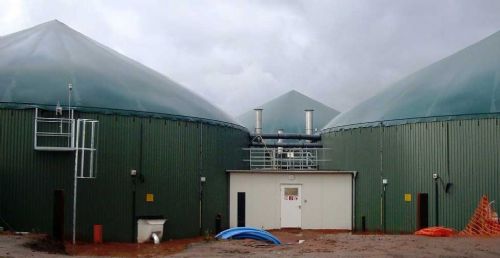
The 2.2MW plant produces
enough renewable green energy for over 3,000 homes from a combination of food
wastes and purpose grown energy crops, currently the annual processing capacity
is 38,000 metric tonnes.
Swancote Energy has a number
of clients from across the West midlands region who send their waste here to
avoid landfill charges and help reduce the environmental impact of waste
management. The site contains the most up to date equipment available for
processing food waste, which includes automated de-packaging machinery. This gives them a crucial advantage when sourcing
waste from retailers as they can accept it as it comes and then separate the food waste from all types of packaging.
Their facility heats up the
macerated waste to create a “soup” which bubbles away and creates a bio-gas (a
mixture of carbon dioxide and methane) and digestate (a nitrogen rich
fertiliser). A combined heat and power plant (generator) burns the biogas to
create “green” electricity and heat. The electricity is fed directly into the
national grid and the heat is used in the process. The digestate is spread on nearby agricultural
land to improve the soil.
Anaerobic digestion is a process for dealing with organic waste which is sustainable, recovers the
maximum energy and is a completely closed system with no emissions to air. Income is generated through a combination
of Feed in Tariffs and sales of electricity into the grid. In addition to this
food waste attracts a gate fee as businesses will pay to get rid of it.
Owners Edward and Simon
Davies said
“We could see that cost of
power was only going to increase over the next 20 years. We realised that the
payment tariffs available for AD would provide an alternative source of income
for the farm as well as providing clean, renewable energy,”
This comment has been removed by the author.
ReplyDeleteWith today's environmental concerns, it's especially important to find a plastic composter. composter usa is one company that makes a difference.
ReplyDelete